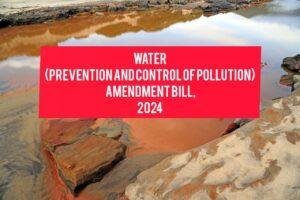
Why in News?
Recently, the Water (Prevention and Control of Pollution) Amendment Bill, 2024 was adopted by both chambers of Parliament.
What are the key provisions of the 2024 Water Pollution Amendment Bill?
- About:
- For a considerable amount of time, India’s environmental laws have been based on the Water (Prevention and Control of Pollution) Act, 1974, which guarantees the sustainable management of water resources.
- The latest change aims to fix a few issues and update regulatory frameworks to meet modern requirements.
- Due to the comparable provisions found in both the Air Act and the Water Act, amendments to the latter are also required.
Major Amended Provisions
- Decriminalization of Minor Offenses:
- Its main goal is to reduce the threat of jail time associated with infractions pertaining to technical or procedural errors by decriminalizing minor offenses involving water contamination.
- The goal is to promote compliance without unduly burdening stakeholders by making sure that fines are commensurate with the seriousness of the offenses.
- Exemption for Specific Industrial Plants:
- The revised bill gives the central government the authority to exclude particular types of industrial plants from some legal requirements, as those listed in Section 25 concerning the creation of new outlets and discharges.
- By eliminating needless burdens on regulatory agencies and streamlining regulatory procedures and surveillance efforts, this clause aims to increase efficiency.
- Enhanced Regulatory Oversight:
- It presents policies to improve state-by-state uniformity and regulatory oversight.
Critiques
- Opponents contend that the law violates the federalism principle and aims to centralize all powers.
- They contend as well that it is difficult to address an issue like the environment without feeling a certain level of intense fear.
- Concerns regarding the possible impact on transparency in addressing water contamination issues are voiced by certain commentators.
- They contend that easing some restrictions could jeopardize industry and regulatory agency accountability, resulting in reduced environmental management openness.
What are the Salient Features of Water (Prevention and Control of Pollution) Act, 1974?
- About:
- Its enactment aims to prevent and regulate water contamination while preserving or regaining the water’s wholesomeness.
- In accordance with Sections 3 and 4 of the Act, respectively, the Central and State Pollution Control Boards have been established.
- Established in September 1974, the Central Pollution Control Board (CPCB) is a legislative body that was created by the Water (Prevention and Control of Pollution) Act of 1974.
- Additionally, the Air (Prevention and Control of Pollution) Act of 1981 gave the CPCB the authority and duties that it currently possesses.
- It collaborates with the State Pollution Control Boards and other organizations while operating under the Ministry of Environment, Forests, and Climate Change (MoEFCC).
- Prior Amendments:
- The Act was revised in 1978 and 1988 to remove some ambiguities and provide the Pollution Control Board additional authority.
- Important responsibilities for local governments and industry include:
- Any industry or municipal body that releases trade or household effluent into water, streams, wells, sewers, or land must first obtain approval from the State Pollution Control Board.
- Following receipt of the application, the State Board may either grant approval subject to particular terms and deadlines or deny consent with a written explanation.
- Industries that discharged trade or effluent waste prior to the Act’s enactment are subject to similar regulations.
FAQs
Q1: What is Section 24 of the water pollution Act?Ans: Section 24: Prohibition against disposing of contaminating material in a stream or well, etc. Q2: What is the water Act Prevention and Control of pollution?Ans: The Water (Prevention and Control of Pollution) Act of 1974: What is it? As its name implies, this Act was the first piece of law in independent India to recognize the necessity for an institutional framework to handle water body contamination. Q3:When was the water pollution Control Prevention Act passed?It was entrusted with the powers and functions under the Water (Prevention and Control of Pollution) Act, 1974.
I don’t think the title of your article matches the content lol. Just kidding, mainly because I had some doubts after reading the article.